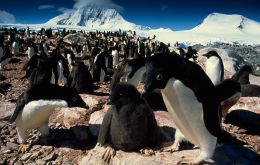MercoPress. South Atlantic News Agency
Tag: Adelie penguins
-
Sunday, August 27th 2023 - 14:48 UTC
Emperor penguins in danger due to sea ice melting

According to a peer-reviewed British Antarctic Survey report released late last week, the melting of sea ice might have caused the death of some 10,000 Emperor penguin chicks by the end of 2022.
-
Wednesday, March 7th 2018 - 09:16 UTC
NASA satellites help discover super-colony of Adelie penguins in Antarctica Danger Islands

A thriving “hotspot” of 1.5 million Adelie penguins, a species fast declining in parts of the world, has been discovered on remote islands off the Antarctic Peninsula, surprised scientists. The first bird census of the Danger Islands unearthed over 750,000 Adelie breeding pairs, more than the rest of the area combined, the team reported in the journal Scientific Reports.
-
Monday, October 16th 2017 - 11:30 UTC
Massive starvation of Adelie penguin chicks; allegedly extensive ice late in summer to blame

Thousands of Adelie penguin chicks died in Antarctica early this year, in an event now prompting conservationists to call for the urgent protection of east Antarctic waters. Scientists studying a colony of more than 18,000 pairs of Adelie penguins in the French Antarctic territory, Adelie Land, discovered only two chicks had survived at the start of 2017. The rest of the chicks had starved.
-
Wednesday, April 26th 2017 - 08:10 UTC
Twelve million penguins in Antarctica, according to the 2017 SOAP report

April 25 is World Penguin Day, timed to coincide with the annual northward march to the sea of Antarctic penguins, as autumn edges toward winter in that part of the world. There are 12 million penguins in Antarctica, according to a new report – the inaugural State Of Antarctic Penguins 2017 (SOAP) report – also released on Tuesday.
-
Wednesday, May 7th 2014 - 06:21 UTC
Live avian influenza virus discovered in Antarctica Adélie penguins

Researchers have found a new type of avian influenza virus in a group of Adélie penguins (pygoscelies adeliae) from Antarctica. Aeron Hurt, PhD, a senior research scientist at the WHO Collaborating Centre for Reference and Research on Influenza in Melbourne, Australia, said that this is the first time that a distinct, live flu virus has been found in these birds.
